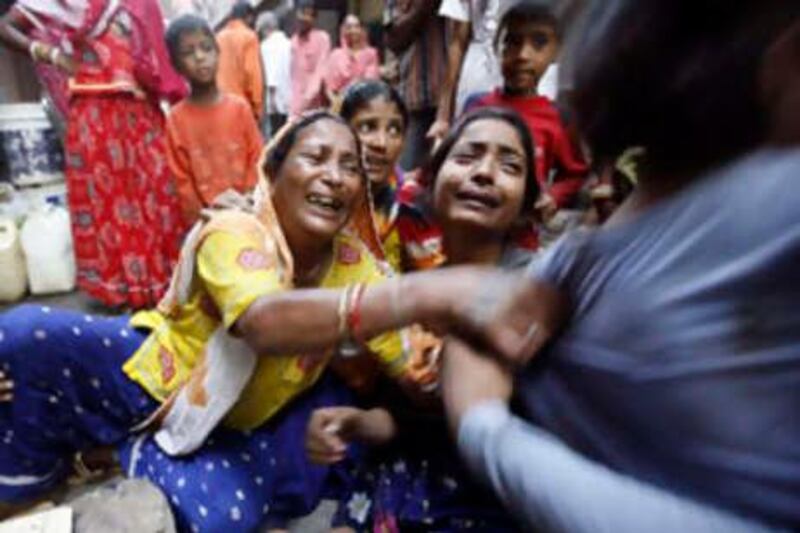NEW DELHI // Sagar Sharma did not pay much attention to the grey scooter parked outside his shop yesterday. It was a typical Saturday afternoon in the south New Delhi market and his stall was doing brisk business in paan and cigarettes. Just before 7pm, the first bomb went off about 300 metres away, from inside a rubbish bin at the exact opposite end of the market. Hordes of evening shoppers and strollers suddenly came stampeding in his direction. Three minutes later, a second explosion erupted, this time it was from the grey scooter outside his shop. "Suddenly, the second blast was right here," recalled Mr Sharma, still very disoriented after the explosion. "I saw a flash. I couldn't hear for some time after that." The blast brought down shop signs, mangled street lights and shattered windows as high as the second storey. It destroyed shelves of cigarettes behind the merchant - but left Mr Sharma unscathed. He was not alone. At the time of the blast, the market was packed with several hundred people, perhaps at the busiest time of the week. The miracle is, not one person, according to HGS Dhaliwal, the deputy police commissioner, was hurt in either explosion. The senior police officer described both bombs as "low intensity". That was just the beginning of New Delhi's long night. While bombs exploded in Greater Kailash, in two other parts of the city, nearly identical scenes were playing out. Except with deadlier results. Five explosions ripped across the city at the peak of the shopping hour, killing more than 20 and injuring dozens, Shivraj Patil, India's home minister, told reporters. The blasts occurred in west-central Delhi's Karol Bagh as well the city's most popular tourist area, Connaught Place, in quick succession. Late last night, police defused another two live bombs, one of which was placed at the city's most recognisable monument - India Gate. At the scene of the Greater Kailash blasts, police officers responded quickly, roping off the devastated areas and locking down the neighbourhood. While witnesses did not see anyone fleeing from the scene, one tell-tale clue remained: the remains of the grey scooter, its seat blown off and its body riddled with tiny holes. Heaps of broken glass, wires and fluorescent light tubes from neighbouring shops completed the picture of carnage. If India's 'summer of the bomb' has one recurring feature, it is the scooter. In Surat, where some 25 bombs were found and defused in July, scooter and bicycle shops were targeted by police with owners being urged to be extra wary of buyers. Scooters and rickshaws have proven a favoured mode for delivering explosives. Or else, devices, such as the one that went off in the rear of the Greater Kailash market, are simply left in rubbish bins. Most unsettling for India, however, is the realisation that the recent spate of domestic terror, which has wracked Jaipur, Bangalore and Ahmedabad, has finally hit in the capital. In May, an unheard of group, calling itself the Indian Mujahideen, claimed responsibility for a series of explosions in the tourist city of Jaipur that killed 61. Two months later, serial blasts ripped through the southern cities of Bangalore and Ahmedabad, killing more than 50 people. Another round of bombs was found in the diamond capital of Surat - and defused by police. Although investigators subsequently arrested 10 people in connection with the bombings, the shadowy group claiming responsibility - the Indian Mujahideen - warned that it was not done yet. In emails to media outlets, the group promised more attacks in more cities, and not only in New Delhi, but against prominent businessmen, politicians and even Bollywood actors. And indeed, not long before last night's blasts in New Delhi, Indian Mujahideen sent what it said was the "Message of Death" to a number of Indian media outlets. "In the name of Allah, Indian Mujahideen strikes back once more ? Do whatever you can. Stop us if you can," the message said, according to reports. While the group's origins remain unknown, security experts are pointing the finger in a predictable direction - to Pakistan. "That is obviously a cover name," said Bharat Karnad, a security analyst with the New Delhi-based Centre for Policy Research, said after the blasts in July. "It could be from ISI [Pakistan's Inter-Services Intelligence] or any of the banned outlets. They just put a moniker to the activity. It's no big deal. No one knows what it is. It's never been there before. Police have no sense of it." New Delhi, on the other hand, got its first sense of the Indian Mujahideen last night. And it is not likely to be the city's last. The group claims four more bombs are primed to explode in the city. ccotroneo@thenational.ae
Delhi explosions kill more than 20
Indian Mujahideen claims responsibility for attacks and claims four more bombs are primed to explode in the city.

More from the national




